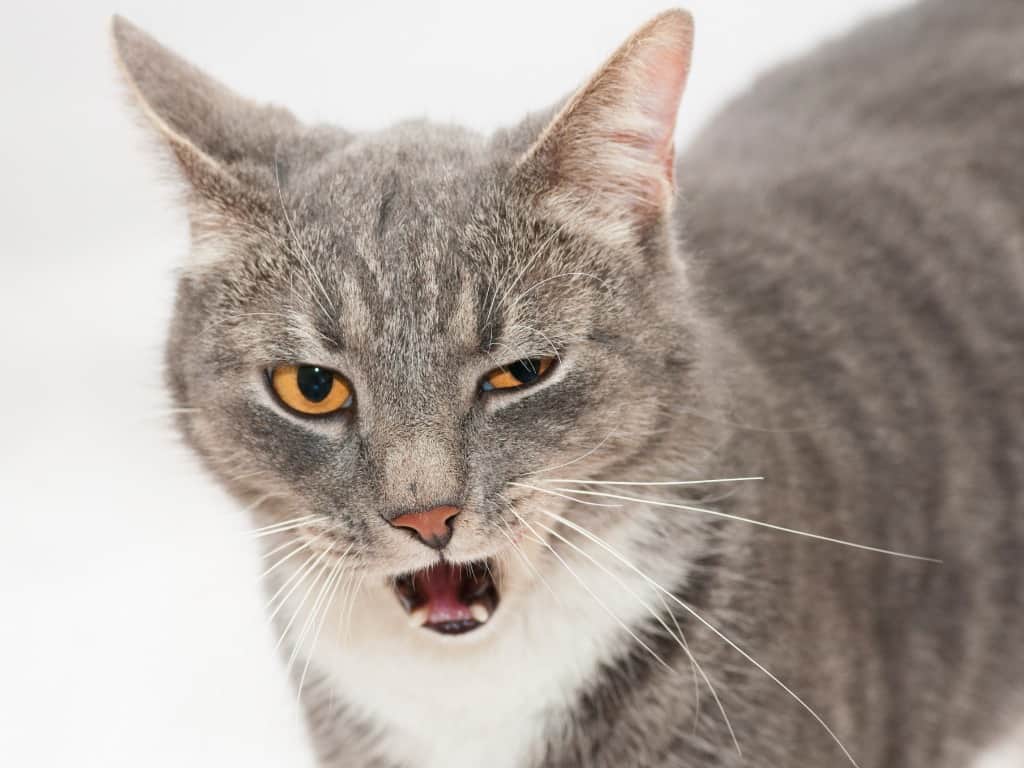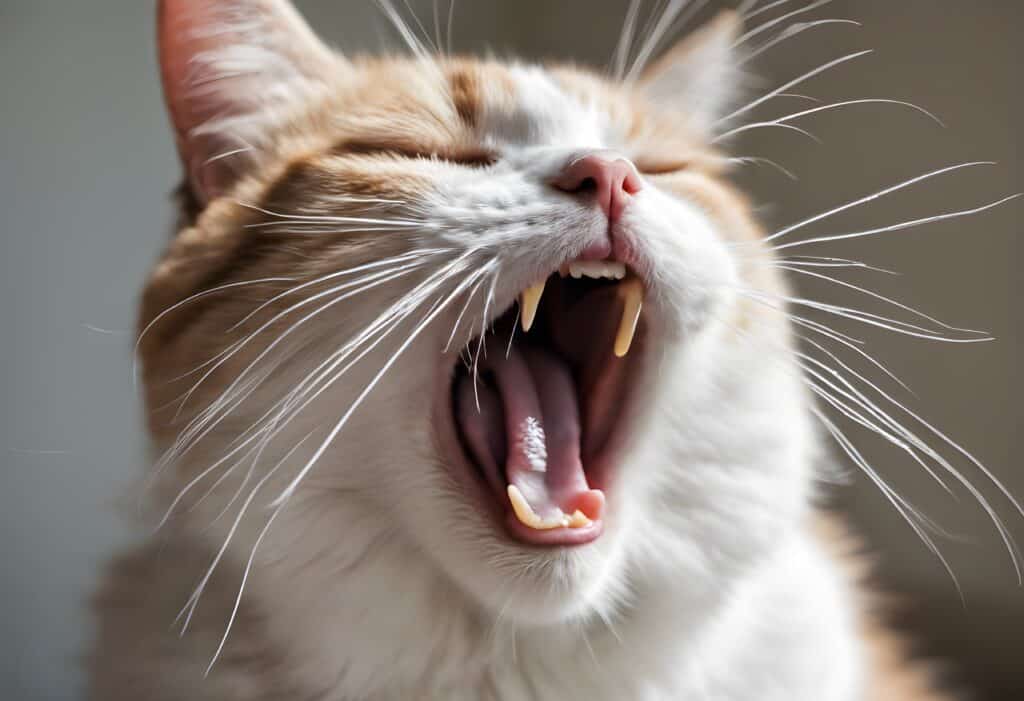Did you know that cats can get allergies just like people do? This may be surprising to some, but it’s true. Allergies in cats can lead to sneezing, just like in humans. But that’s just one reason for cat sneezing.
Cats sneeze for various reasons, ranging from minor allergies to more complex medical conditions. Understanding what causes a cat to sneeze will help you provide the best care.
Here’s the essential information on the sneezing issue that might be affecting your furry companion.
Sniffing Out the Culprits: What Causes A Cat To Sneeze
Innocuous Intruders
Just like their human companions, cats may sneeze simply because something irritates their nasal passages. Dust from cat litter, pollen, perfume, cigarette smoke, or air fresheners can provoke an occasional sneeze – a natural reflex to clear out the nasal cavity.
Annoying Allergies
Allergies in cats can take many forms, and sneezing may be one of them. Just like humans, cats can become sensitive to common allergens such as mold, dust mites, or pollen. Other signs that your cat might have allergies includes wheezing, itching, runny nose, watery eyes, and skin irritation.
Peek-A-Boo, I Don’t See You: Foreign Objects
Frequently, a cat’s inquisitive nature can result in them sniffing up of grass blades, feathers, or even small foreign objects like dust or plant particles. These objects can irritate the delicate lining of their nasal passages, prompting a succession of rapid sneezes as their body’s innate defense mechanism to expel these unwelcome visitors and uphold respiratory well-being.
Sneezing usually continues until the foreign body is expelled and the irritation dissipates. If the cat cannot get rid of it on their own, veterinary intervention will be necessary.
Under the Weather: Viral and Other Infections
Viral infections, like feline herpesvirus and feline calicivirus, are among the most common causes of sneezing in cats. Collectively called upper respiratory infections (URTs) these “cat colds” can produce symptoms like runny nose, watery eyes, and respiratory symptoms.
Bacterial or fungal sinus infections, although less typical, can be the underlying cause of persistent sneezing. Fungal infections, though rare, are sometimes seen in outdoor cats who explore environments ripe with fungal spores.
Dental Deliberations: Gum Disease and Dental Ailments
Did you know that a cat’s dental health can be directly linked to sneezing? Dental disease can cause inflammation which may have an impact on the nasal sinus passages, leading to sneezing. It’s always a good idea to schedule regular dental check-ups for your cat.

Rare Reverse Sneeze: What Is It?
Despite the moniker, a reverse sneeze isn’t a sneeze at all. It’s a spasm that occurs when something irritates the throat or soft palate, causing air to be rapidly pulled in through the nose. It may sound concerning, but it’s generally less alarming than it seems.
Reverse sneezing in cats is often caused by minor nasal irritations like allergens, chemicals, or temperature changes. While it may sound strange and alarming, reverse sneezing is usually harmless and resolves on its own.
However, it’s important to keep an eye on it. If it happens frequently, it could indicate a more serious nasal or throat issue.
Other Symptoms to Sniff Out
Persistent sneezing can indicate any number of underlying health issues which may require professional diagnosis and treatment.
Keep a watchful eye on any accompanying symptoms like nasal discharge (especially if it’s thick or discolored), eye discharge, coughing, wheezing, difficulty breathing, lethargy, loss of appetite, and fever. Chronic upper respiratory infections may lead to more severe cases.
If these symptoms persist, seeking a proper diagnosis is the best way to ensure your cat’s health is not at greater risk.
When to Pounce to the Vet
Though sneezing is not uncommon among cats and often not a cause for concern, it’s important to pay attention to any changes in your cat’s behavior or health.
Excessive sneezing accompanied by the aforementioned symptoms warrants a visit to your veterinarian for a physical exam, as does any sneezing that lasts more than a day or two.
Symptoms that are worsening rather than getting better, or any signs of respiratory distress such as struggling to breath, open mouth breathing, or a blue-grey color to the tongue and lips (which indicate a lack of oxygen) are an emergency and immediate veterinary care is needed.
Cats are expertly adept at hiding any signs of illness until it’s very advanced, so it’s important to keep a close eye on your cat for any subtle changes that could indicate an underlying health issue.
When in doubt, seek help from your veterinarian. With proper care and attention, you can help your sneezing cat feel their best again!
Treatments to Tackle the Tickles
Treatment options will vary based on the proper diagnosis of the underlying cause of your cat’s sneezing. Mild cases might require little to no intervention, while more complex conditions could necessitate antiviral medications, antibiotics or antifungal medication to treat sinus infections, or in some cases, surgery to remove blockages or growths like nasal polyps.
For seasonal or environmental allergies, your veterinarian may recommend antihistamines to alleviate symptoms. Other potential courses of action include special diets to address food allergies and the use of air purifiers or humidifiers for a cleaner, more comfortable environment.
Prevention is Purrfect
While some causes of sneezing in cats are unavoidable, there are steps you can take to help prevent and minimize the likelihood of your cat experiencing persistent sneezing:
- Keep your cat’s living area clean and well-ventilated.
- Maintain a regular grooming routine to minimize allergens and irritants on your cat’s fur.
- Provide a balanced diet to support your cat’s immune system.
- Keep your cat’s vaccinations up to date to prevent infections.
- Minimize exposure to potential allergens such as dust, pollen, and cigarette smoke.
- Address any environmental factors that may contribute to sneezing, such as air quality or household chemicals.
- Promptly treat any underlying health conditions or infections that could lead to sneezing.

Wrap-Up: Healthy Cats Lead to Happy Homes
As guardians of our cat’s health, it’s important to understand the causes of sneezing. Whether it’s due to environmental factors or challenges to their immune system, paying attention to changes in your cat can make a big difference.
For those mild symptoms, the good news is that your cat will return to their playful, purring self after the sneeze attack subsides. For sneezing that is recurring or ongoing, this is a clear sign that needs attention and sometimes, affectionate concern.
So, whether it’s just a case of the sniffles or an underlying condition that’s not so obvious, you now have the knowledge to take the best possible action. And remember, sometimes the best remedy for a sneezy kitty is a little extra love and care from their favorite human
Sources
- Feline Respiratory Disease Complex: https://www.merckvetmanual.com/cat-owners/lung-and-airway-disorders-of-cats/feline-respiratory-disease-complex
- Nasopharyngeal disease in cats: https://pubmed.ncbi.nlm.nih.gov/22511473
- Chronic Rhinitis in the Cat: https://www.sciencedirect.com/science/article/abs/pii/S0195561619301639

